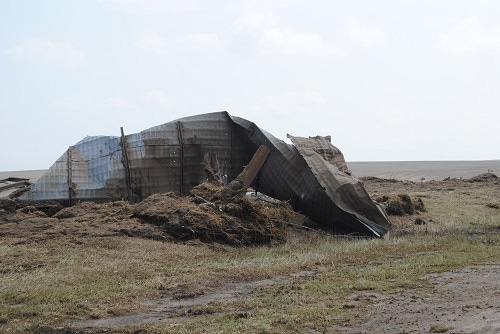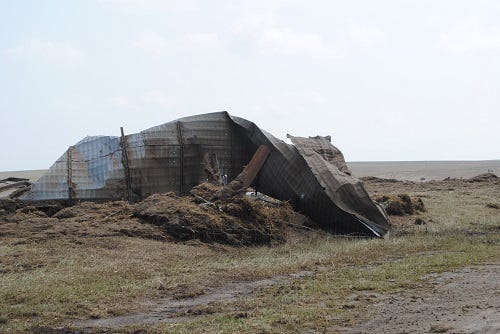
I know you are busy looking at the planter and making sure your tractors and equipment are ready for the upcoming planting season. Warmer weather so far this spring in Nebraska has allowed many producers to think about field work earlier than last season. Of course, we all know that winter can still cause some chaos in April, but our planning is focused now on the fields. Most spring and summer months in the Great Plains offer crazy weather extremes. The big tornadoes that struck last summer are nothing new. We’ve been experiencing them as long as I can recall. It’s part of living where we do.

But the killer tornadoes and extreme hail storms of last summer do remind us that we need not only prepare our equipment for spring fieldwork right now, but we also need to think about a severe weather plan for the farm.
WHAT DO YOU THINK? What is your severe weather plan on your farm in case of storms? You can share your thoughts and observations in our comments section.
I am reminded of an April storm that hit our place about 20 years ago. After feeding our sows in their open lots one evening, I walked back to the house and watched the sows eating on a feeding floor near several low hutches we used to provide shelter for the herd. I sat on a bench near the house and was scratching the ears of our farm dog when the wind suddenly changed direction, from the northwest to the southeast.
A minute or two after the wind switched, it began to blow in gale force. Suddenly, one of the large wooden hutches in our sow yard was lifted and pulled clear from its anchors and thrown in the air, across the fence and into two large cottonwood trees at the rear of the pens. The sows were eating, so they jumped at the noise, but were not inside the shelter. No one was injured, but it was a weird thing to watch. That was just one little example that I recall out of many where the power of Mother Nature was on display.
RELATED: Two nights of tornadoes terrorize Northeast Nebraska farms, communities - Nebraska Farmer
I was gleaning several information sources and came up with a few tips for preparing your farm for severe spring weather. Not all of this will apply to everyone, but the information gets us thinking about preparedness.
1 - Make sure machinery and vital equipment is secured from the wind or floods.
2 - Check generators regularly throughout the year, to make sure they are in working order.
3 – If flooding is a worry, secure propane supply tanks and shut off the propane at the tank.
4 – Identify high places in the case of flooding, or secure places for other weather events where livestock can be relocated if necessary.
5 – Keep a list of important phone numbers and emergency contacts in a safe place where everyone knows how to find them.
6 – Draw up an emergency plan in case of specific events, like fire, flood, wind storm, blizzard and make sure all family members and farm employees know what to do in each case. Develop a safe gathering location for everyone to go to in case of emergency.
7 – Have fresh water supplies and food available and stored safely for human consumption.
8 – If your driveway or roads exiting the farm are blocked, what is your alternate escape route?
9 – Have an off-site secure storage location for important documents and records.
10 – Keep an active and updated inventory of feed, livestock, grain, equipment and other key farm assets.
These are just a few general ideas about emergency preparedness for the farm and ranch. Tell us about your emergency planning or let us know how your preparedness paid off when your place was hit by the unexpected.
Don McCabe, Nebraska agriculture thanks you!
I want to wish a happy retirement to my friend and colleague, Nebraska Farmer editor, Don McCabe. Don has served Nebraska Farmer for 37 years, and is retiring this week. I’ve worked full-time for the magazine since 2010, and during that time, I can honestly say that Don has been more than just the editor and a trusted colleague, but also a great friend. We will certainly miss him. The Nebraska Unicameral honored Don with LR117, a resolution saluting his dedicated service to the state's ag industry. As the planters are rolling across the Nebraska landscape this spring, I feel that we all owe Don a debt of gratitude for all he has done to tell the story of the state’s farmers and ranchers. Thanks Don for serving us so well! (You can read Don's editorial, "My thank-you to our readers" on page 14 of your March issue of Nebraska Farmer.)
Welcome new Nebraska Farmer editor, Tyler Harris
With Don's retirement, I want to take this opportunity to welcome our new editor, Tyler Harris, who is taking the helm. Many of you will have the opportunity to meet Tyler very soon as he travels the state to cover field days, tours and farm and ranch events. Tyler is serving as Nebraska Farmer's 16th editor and I hope you will all join me in welcoming him into his new position and to our great state. (You can read Tyler's first Nebraska Farmer editorial, "Eager to explore Nebraska agriculture" on page 10 of your new April issue.)
FINAL NOTE: If you recall last week's WHAT DO YOU THINK? section, I promised to give details about the difference between a controlled burn and a prescribed burn. From Pheasants Forever Farm Bill wildlife biologist, Cassidy Gerdes, I have this response. A controlled burn is a practice like burning tree or brush piles or burning garbage in a trash barrel. A prescribed fire is a prescription land treatment where fire is put to the land with a purpose to accomplish a particular objective. Thanks Cassidy for that information.
Be sure to catch the latest farm news several times a day at Nebraska Farmer online, and you can always follow us on Twitter at Husker Home Place #NebFarmNow.
About the Author(s)
You May Also Like






